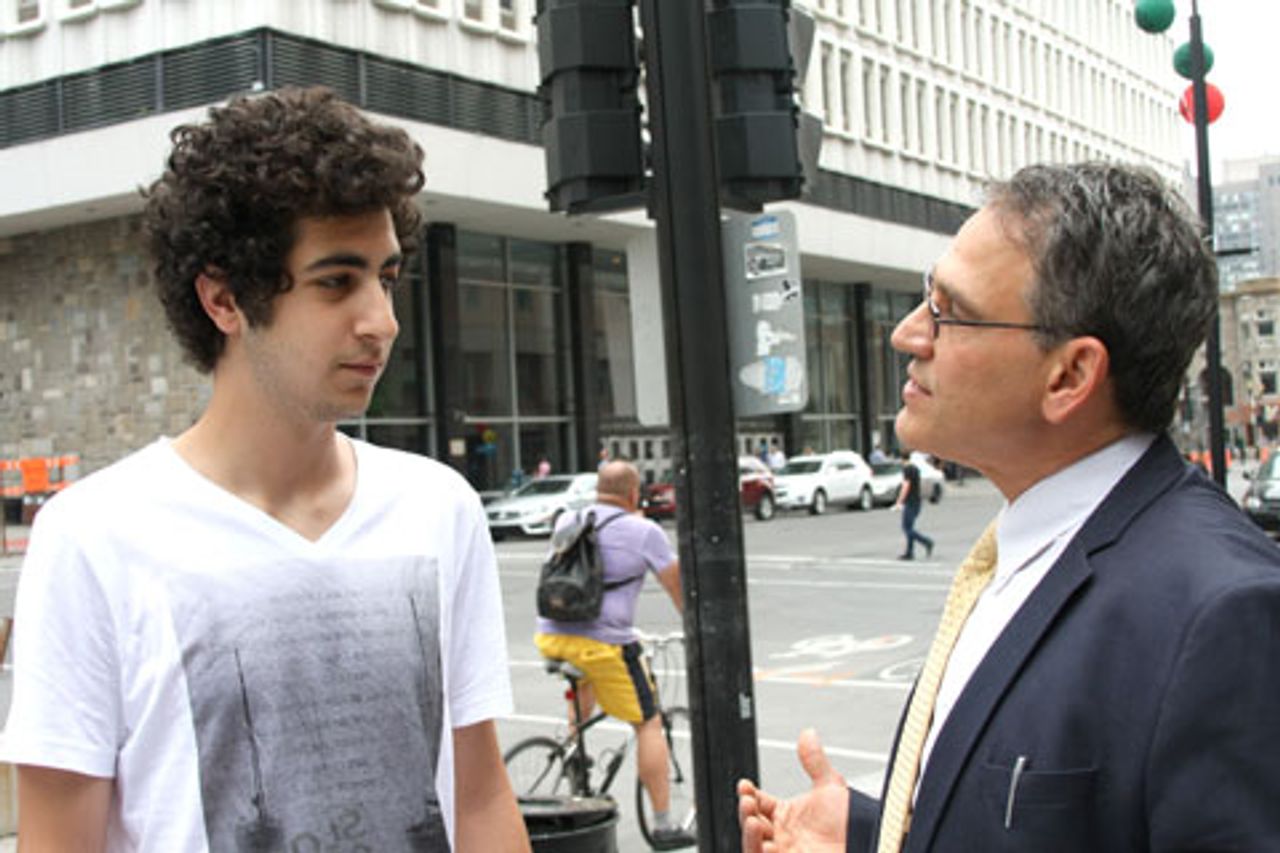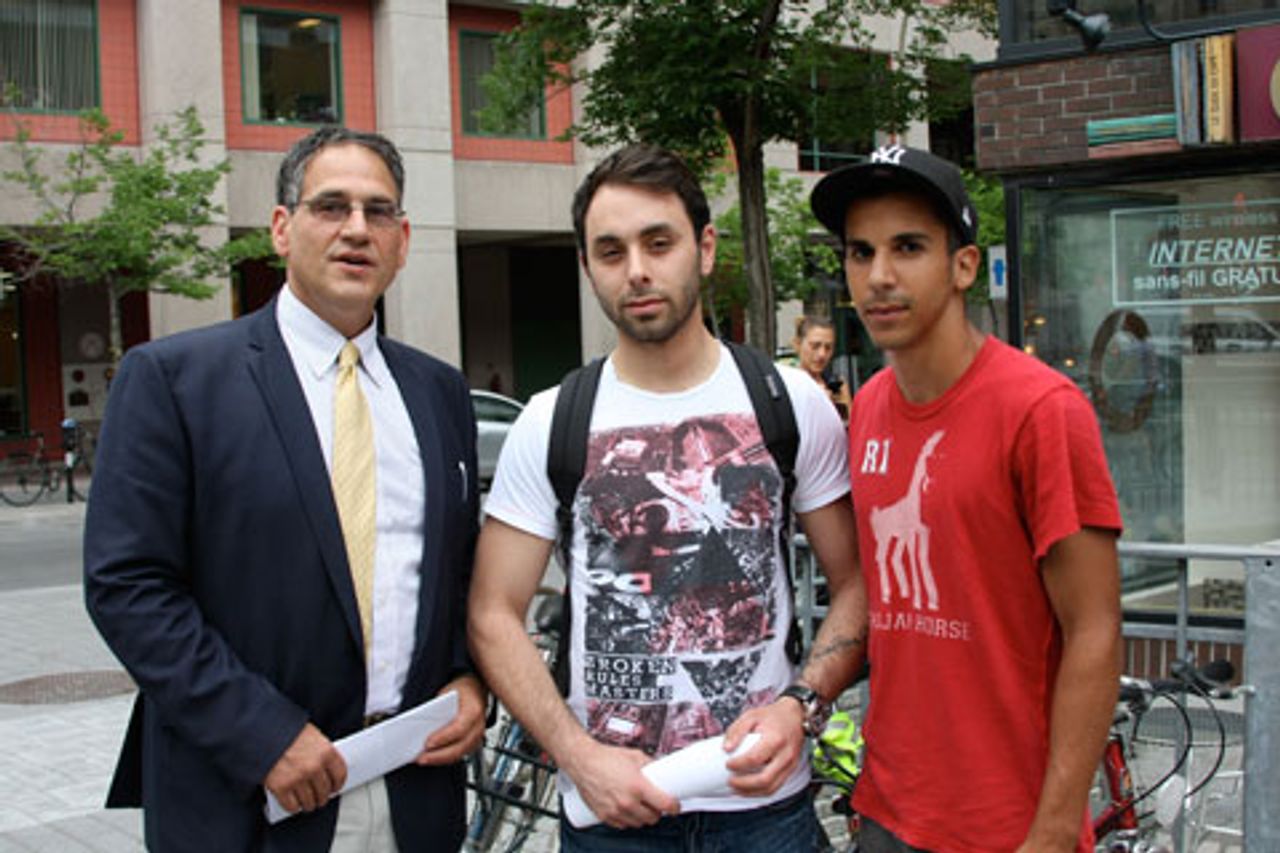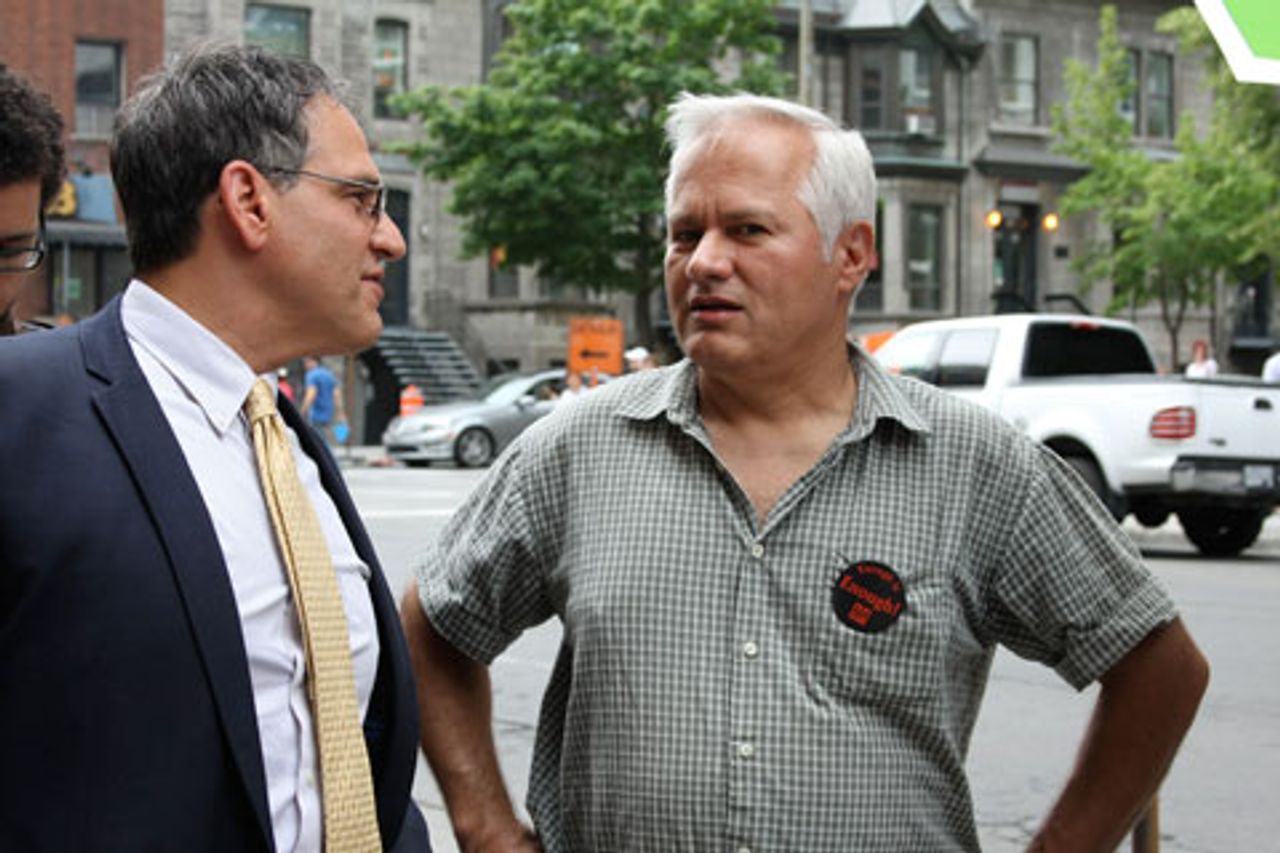 White speaks with Concordia University student
White speaks with Concordia University studentJerry White, US presidential candidate for the Social Equality Party (SEP), campaigned in Montreal on Tuesday, bringing the party’s fight for the international unity of the working class to Canada. White is scheduled to speak at a public meeting Thursday that is sponsored by the SEP of Canada on the Quebec students struggle.
Students in Montreal, the province's largest city, have been on strike for four months to fight severe tuition increases. Last month, Quebec Premier Jean Charest passed a sweeping anti-democratic law, Bill 78, which bans all gatherings of more than 50 people without prior approval. While passed against the student strike, the measure is aimed at crushing any opposition to the government’s austerity measures and the corporate attack on jobs and living standards.
On Tuesday afternoon, White spoke to students and university support staff at two English speaking campuses, Concordia and McGill Universities. He also spoke to workers and young people in the Plateau neighborhood of Montreal where SEP supporters helped translate the conversations into French.
Many young people were surprised to meet a socialist presidential candidate from the United States. They wanted to know what he was doing in Canada where he couldn’t get votes. White explained that workers and young people all over the world were facing attacks like the Quebec students, and that it was necessary to unite the working class internationally to defend our social rights. The SEP candidate was warmly received and engaged in several discussions about the student strike, conditions of workers and young people in the US and the international socialist program the SEP is fighting for.
 Jerry white and Concordia students: Steve McFee (white shirt), Angel Rodriguez (red shirt)
Jerry white and Concordia students: Steve McFee (white shirt), Angel Rodriguez (red shirt)Angel Rodriguez, a recent graduate of Concordia, expressed frustration about the current trajectory of the protests. “What is next after the protests?” he asked. “There doesn't seem to be an aim beyond just gathering more people together.”
White explained, “The critical question is political program and perspective. Right now, the student unions are limiting the struggle to the question of tuition increases and to Quebec alone. The demand by students that education should be a basic social right is absolutely correct. However, this requires a struggle against the entire economic and political system, which defends the financial and corporate elite against the interests of the vast majority of the population. That means mobilizing the working class to fight for a socialist alternative to the capitalist system.”
This found resonance with Angel, who said, “Students do need to reach out to workers. Right now, the government is doing its best to forcibly divide the students and the workers. At a recent festival, the students were being specifically targeted and tossed out. And it wasn’t just students involved in the strike, but young people in general. It was basic profiling.”
Angel then asked White, “What are you proposing?”
“The SEP is fighting to build a mass political movement of the working class that will fight to take political power and reorganize society to meet human needs, not private profit. Nothing can be gained by pressuring the governments, which are beholden to the banks and transnational corporations. Look at what happened in Egypt. Those who said the military government could be relied on to meet the demands of the masses led workers and youth into a trap.”
“It’s true that the powers that be have to be fought and the whole system overthrown,” replied Angel, “but it won’t happen overnight.”
“That is true,” White said, “but it is the only way forward. In every country, the corporate-backed politicians have responded to the social demands of working people with repression. A change is only possible if workers take power in their own hands. That’s why we are fighting for students to turn to the working class and make this struggle about the defense of all social rights, which means a conscious struggle against capitalism itself.”
White said the SEP’s call for students to turn to the working class meant a struggle to free workers from the grip of the trade unions, the nationalist Parti Quebecois and the NDP. This was the opposite of what the leadership of the student unions—CLASSE, FECQ and FEUQ—were doing, he said.
 Jerry White and Concordia University support staff worker, who was attending a protest against cuts
Jerry White and Concordia University support staff worker, who was attending a protest against cutsOutside of Concordia, staff members were protesting over conditions facing workers. White spoke with workers. One veteran worker denounced the anti-democratic law implemented by the Charest government. “The new law, Bill 78, is ridiculous. It criminalizes all protests. Even our demonstration today probably needed the go ahead from the government, or else we'd have police surrounding us. The entire affair is absurd.”
“We’re fighting because we want decent living standards. The retirement age was just raised to 67, wages are going down, but the banks were bailed out. I thought that in America businesses were supposed to stand on their own merits. But the government gave them trillions. It’s totally hypocritical.
“We’re also out picketing in support of the students who are facing similar issues. They are facing tuition hikes; we are facing wage decreases. In general, that means more money to big business and less to workers.”
Another Concordia student commented, “The problem is that politics everywhere has gotten out of hand. Everywhere is crashing, especially like in Greece. What’s worse is that the government here is trying to raise education costs while keeping the high taxes the same. The taxes are supposed to pay for our education, so why are they raising tuition?”
White took up the student’s conception of “politics.” “When you say politics, you mean the politics of the capitalists, the politics of deception and dishonesty. Based on this there are various groups, whether in the Occupy protests or the student unions here that say, ‘No politics.’
“In reality, they adapt to the dominant politics and promote the Democrats in the US or the Parti Quebecois here,” White said. “What we mean by politics is the fight for the independent interests of the working class by drawing lessons from the most critical experiences of history. Our politics, socialist politics, is to tell the working class the truth so it can fight for its own interests.”
“What do you think of Ron Paul?” the student asked. “He seems to want to minimize the influence of government.” Interestingly, the student was one of several during the day that raised questions about the Republican candidate.
White responded, “Ron Paul is presented as a maverick and opponent of war and attack on democratic rights. But he is a capitalist politician, and his opposition to the government boils down to getting rid of the remaining restraints on big business, like child labor laws and the minimum wage. That's where his politics, and that of the libertarians, lie.”
White asked another student what prospects young people have in Quebec. “’Prospects?’ the student said. “We don’t even use that word. We don't know if we’ll have a job or a future.”
White also campaigned at the Mont-Royal Metro subway stop in the Plateau neighborhood. He spoke with secondary (high school) and university students, and young workers in the area, where solidarity protests have been held in support of the student strike.
A group of students from Mexico who were studying in Montreal told White that Mexican students were also striking to defend the right to education.
Another young worker, Helene, who was on a work exchange program from France, wore a red square on her bag and said she supported the students. “But if I protest,” she said, “I could be arrested and deported.”
Helene was skeptical of France’s new Socialist Party president, Francois Hollande, saying that all the politicians promise change and then defend the wealthy. “Obama said he was for ‘change,’ but he’s done nothing to change.”
She was sympathetic to the ideas of socialism but said she was afraid that anyone who took power would abuse it and betray working people. Responding, White discussed the experience of the Russian Revolution and the struggle of Leon Trotsky against the rise of the Stalinist bureaucracy.
“Our party was founded by Leon Trotsky, who fought for internationalism and against the Stalinist program of socialism in one country. It was not human nature, let alone Marxism, that led to Stalinism, but the isolation of the first workers’ state. The problems of modern society, poverty, global warming, inequality,” White said, “can only be resolved by marshaling the technological, human and natural resources of the globe.”
Helene responded positively to these issues and said that she could see that workers and young people in every country—Canada, the US, Greece and Spain—were facing the same problems and struggles.
